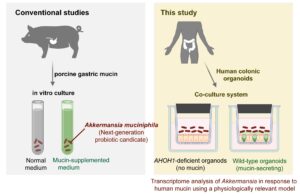Moemi Matsuzaki1,2, Atsuki Imai1, Kota Yanagisawa1, Tsukasa Oda1, Hideo Satsu3, Nobuo Sasaki1, Eiji Miyauchi1 (1. Laboratory of Mucosal Ecosystem Design, Institute for Molecular and Cellular Regulation, Gunma University; 2. Department of Biotechnology, Faculty of Engineering, Maebashi Institute of Technology University; 3. Graduate School of Food and Population Health Sciences, Gunma University; *Corresponding Author)
About
Akkermansia muciniphila is an obligate anaerobe that utilizes mucin in the gut and has been proposed as a next-generation probiotic due to its potential in mitigating metabolic disorders. However, its responses to human mucin and interactions with the host remain unclear, as most studies have relied on porcine mucin in in vitro experiments.
In this study, we established a co-culture system using human colonic organoids and A. muciniphila, including a mucin-deficient model generated by knocking out the transcription factor ATOH1. RNA sequencing analysis revealed mucin-dependent gene expression patterns distinct from those seen with porcine mucin. Notably, the host interaction-related gene Amuc_1100 was upregulated only in co-culture with wild-type organoids, suggesting a human mucin-specific response.
These findings underscore the importance of human-relevant models in microbiome research and provide new insights into how A. muciniphila may function in the human gut.
Paper information
Matsuzaki M, Imai A, Yanagisawa K, Oda T, Satsu H, Sasaki N, Miyauchi E. Mucin-dependent transcriptional dynamics of Akkermansia muciniphila in co-culture with human colonic organoids. Bioscience, Biotechnology, and Biochemistry
Online URL
https://doi.org/10.1093/bbb/zbaf121








